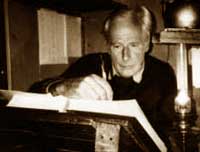Pierre Dansereau, ecologist, visionary and inveterate optimist, believes…
Gaia

- Description
- Reviews
- Citation
- Cataloging
The Gaia Hypothesis is one of the most exciting new scientific theories to emerge in the 20th century. It's the work of a British scientist, James Lovelock, who believes that the earth is itself a living organism, and that life actively creates the environment it needs to survive, by maintaining environmental factors like temperature, humidity and atmosphere. His theory has been embraced by the environmental movement and has stirred up controversy in the scientific establishment.
Lovelock lives in the hills of Devon in southwest England. He's a biologist, doctor, chemist, cybernetician, inventor, and author of science fiction. In this video portrait we meet the man at his home and workshop, and visit the Marine Biological Laboratory in Plymouth, which conducts marine research, that has produced some amazing results, apparently confirming major parts of the theory.
The Gaia Hypothesis gives us a completely new view of the evolution of the Earth and may well be an incredibly productive tool for studying the complex ecological interrelationships that allow life to exist on our planet.
Lovelock lives in the hills of Devon in southwest England. He's a biologist, doctor, chemist, cybernetician, inventor, and author of science fiction. In this video portrait we meet the man at his home and workshop, and visit the Marine Biological Laboratory in Plymouth, which conducts marine research, that has produced some amazing results, apparently confirming major parts of the theory.
The Gaia Hypothesis gives us a completely new view of the evolution of the Earth and may well be an incredibly productive tool for studying the complex ecological interrelationships that allow life to exist on our planet.
Related Films
An Ecology of Hope
Natural Connections
Makes a compelling scientific and ethical case for maintaining biodiversity.
Crossing the Stones
An intimate biography of the Norwegian founder of deep ecology.




